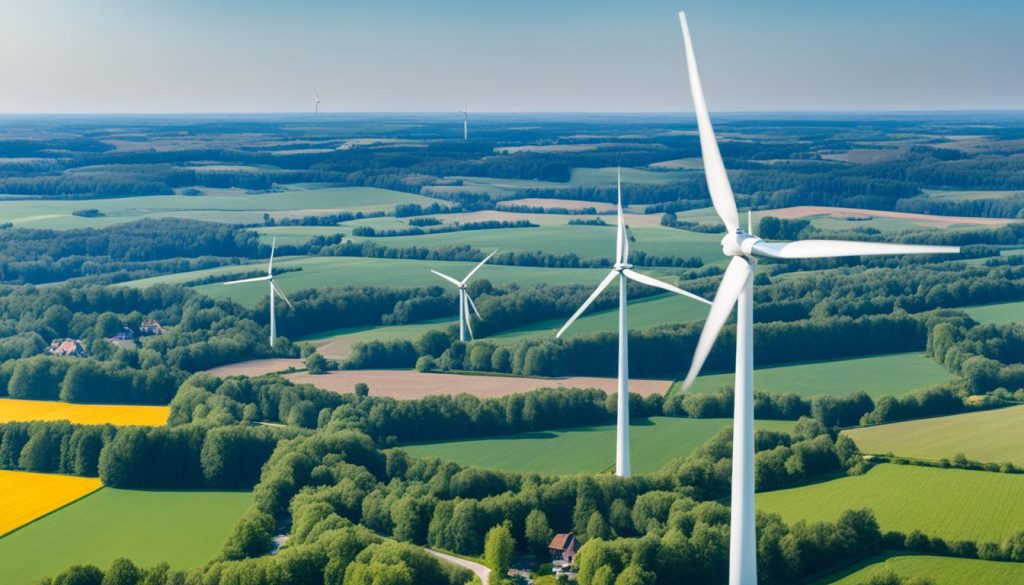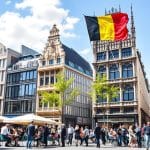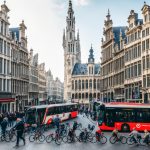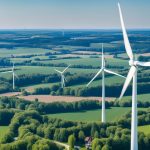Belgium is leading the way in the move to clean, renewable energy. It has set itself up as a model for global efforts to create a sustainable future. Belgium’s strong commitment is helping it use renewable sources for its energy needs and cut down on harmful emissions.
Recognising the need to fight climate change and lessen the use of fossil fuels, Belgium is all in with renewable energy. This drive comes from the top, with the government setting big goals and planning well to meet them.
Belgium aims to use more renewable energy, focusing on wind, solar, water, and biomass. It’s working in many areas, from homes to the sea, to build a varied and strong renewable energy scene.
Not stopping there, Belgium is also big on saving energy and cutting waste. It promotes eco-friendly building methods and green lifestyle choices. This further shows its deep commitment to a future that’s kinder to the planet.
Belgium makes it worth the effort for people and groups to back renewable energy. It gives out money and other boosts to encourage investments. This support encourages teamwork and innovation, helping renewable energy tech grow.
Belgium’s push towards renewable energy is making a real difference. It’s not just about cleaner air and health, but also about new jobs and a stable energy future. The benefits are clear for everyone to see.
The future looks bright for Belgium’s renewable energy scene. Its success stories inspire the rest of the world and show the power of working together against global warming. Belgium is shining a light for a cleaner, sustainable future, leading the way for others to join in.
In wrapping up, Belgium is well on its way to being a worldwide example in renewable energy. Its strong focus on a cleaner tomorrow is sparking new ideas, jobs, and positive changes for our planet. Belgium’s efforts to go carbon neutral are both a guide and an encouragement for the global community.
The Importance of Renewable Energy
In today’s world, renewable energy is more vital than ever. We face climate change and less fossil fuel, making a shift to renewables important for our future. These sources, like the sun and wind, can renew themselves and are cleaner than fossil fuels.
Renewable energy is good for the environment, the economy, and people. It helps to cut down on carbon emissions and air pollution. It also protects the environment and supports greener living.
The Environmental Benefits
Using clean and abundant sources like the sun and wind can help the planet a lot. It cuts down on harmful emissions and safeguards nature. This reduces climate change and protects our air and water from pollution.
Renewable energy also has little impact on the planet’s health. It doesn’t add harmful pollutants to the air or water. This means less harm to the planet and less extreme weather for us.
Economic Opportunities
Adopting renewable energy also boosts job opportunities. It creates new roles in many areas, from building to research. It supports local job growth and new skills training.
As these technologies get better and cheaper, they make our energy supply safer. Countries can rely less on importing fuels, avoiding price shocks. This means stronger, more secure energy for everyone.
Social Advantages
Renewable energy can help whole communities, especially in remote places, get clean, cheap power. This reduces energy poverty and makes life better for everyone.
It also drives innovation and green thinking. Countries investing in renewable energy are leading the way in technology. This leads to a cleaner, brighter future for us all.
Overall, renewable energy offers a way to solve many problems facing us today. It’s a chance for us to build a future where we protect our planet and provide for everyone.
Belgium’s Pledge to Renewable Energy
Belgium is making big promises to focus on renewable energy. This is part of their plan to be more eco-friendly. They want to cut down on harmful emissions and move to cleaner energy. By doing this, Belgium hopes to create a better, greener future for everyone.
Renewable Energy Goals
It has set bold goals for using more renewable energy. By 2030, they want nearly half of all electricity to come from green sources. They are also looking to cut emissions by a third. And, improve energy use in homes and buildings by over a quarter. Plus, they aim to use more green energy in heating and transport. Finally, they want to see more people using electric cars and have the right places to charge them.
Belgium has a plan that covers many different types of renewable energy. They are working hard to meet their targets.
Strategies for Implementation
Belgium is putting in place many ways to get people to use more clean energy. These include:
- Backing new ideas: They’re funding research to make renewable energy better.
- Offering financial help: They give money and other perks to those who start eco-friendly projects.
- Working with companies: They team up with businesses to bring in new green technologies.
- Making laws: There are new rules and goals to help renewable energy grow.
- Joining with others around the world: They work with global partners to share ideas and learn new things about clean energy.
Progress and Achievements
Belgium has done a lot in the renewable energy field. They’ve upped their game, especially with wind and solar power. This not only helps the environment but also creates jobs. It makes energy supply more reliable too.
| Renewable Energy Source | Installed Capacity (2020) |
|---|---|
| Wind Energy | 4,477 MW |
| Solar Power | 5,784 MW |
| Hydropower | 238 MW |
| Biomass | 499 MW |
Belgium is really pushing towards being more sustainable and cutting carbon use. Their effort is not just for them but to encourage other countries too.
Wind Energy in Belgium
Belgium is using wind power to aim for a greener future. Its location and the wind make it perfect for wind energy. Because of this, Belgium has a lot of wind turbines.
Belgium’s Wind Power Capacity: There are more than 480 wind turbines in the country. Together they can make 1,775 megawatts. This is enough electricity for many homes without using non-renewable sources.
Development of Offshore Wind Farms: Belgium is also building wind farms out at sea. The Northwester 2 wind farm, near Zeebrugge, is a great example. It has 23 turbines and can create 219 megawatts. This power helps not only people but also the environment by cutting down on harmful gases.
Benefits of Wind Energy: Wind power helps in many ways. It means less pollution from fossil fuels and helps fight climate change. Wind farms also bring jobs to communities. These jobs are in building, keeping up with the turbines, and running them.
Wind Energy Infographic
| Wind Energy Statistics | Figures |
|---|---|
| Total Wind Power Capacity in Belgium | 1,775 MW |
| Number of Operational Wind Turbines | 480+ |
| Offshore Wind Farm Capacity (Northwester 2) | 219 MW |
| Estimated Households Powered by Wind Energy | Tens of thousands |
This table summarizes Belgium’s wind energy progress, showing its capacity and how many households can benefit.
Solar Power Initiatives in Belgium
Belgium is committed to renewable energy and has invested heavily in solar power. The country now sees lots of solar panels, both in homes and businesses. This shows a big move towards using clean energy.
The government in Belgium is helping a lot too. They offer supports like incentives for those who put solar panels on their roofs. This move cuts down on pollution and helps people save money on their electric bills.
These efforts are changing how we get our energy. Now, in Belgium, many homes and groups can make their energy. Solar panels on roofs are not just for one house; they help the whole country too.
Solar farms, big areas covered in solar panels, are also becoming more common in Belgium. These help the country reach its goals for clean energy. They also reduce how much the country needs fossil fuels.
The government also has a rule where if someone has extra electricity from solar panels, they can sell it. This makes more people want to use solar power. It’s good for the environment and makes the energy system stronger.
Solar power is key to weathering climate change in Belgium. It’s making the country less reliant on older, less clean energy. The move to solar energy is paving the way for a brighter, greener future for everyone.
Hydropower and Biomass in Belgium
Belgium sees great promise in hydropower and biomass for sustainable energy. It is advancing these areas, aiming for a greener future.
Utilization of Hydropower
The country uses moving water to create hydropower. This lessens the need for non-renewable energy sources. Belgium has a big project, Coo-Trois-Ponts, contributing significantly to its renewable energy.
Biomass as a Renewable Energy Source
Belgium values biomass as an important renewable energy source. It’s made from plants and animals and used for various energy needs.
The nation works to turn farm and forestry leftovers into energy. This action cuts its emissions and helps a sustainable energy sector grow.
The Advancements Made in Harnessing Hydropower and Biomass
Belgium has improved its use of hydropower and biomass greatly. New tech and systems are helping these natural sources of energy become more useful.
The country is focusing on less intrusive hydropower plants. This method keeps water flowing free and generates power sustainably.
Belgium also turns organic waste into biogas for energy. These achievements show their dedication to green energy.
The Environmental Benefits of Hydropower and Biomass
Hydropower and biomass are key to Belgium’s environmental aims. They lower emissions and are sustainable choices.
Biomass is especially good for the planet. It takes in and uses the same amount of carbon, making it almost carbon-neutral.
The Future of Hydropower and Biomass in Belgium
Belgium will keep investing in hydropower and biomass. It wants a more varied energy mix, relying less on non-renewable options.
Looking ahead, Belgium will focus more on small hydropower and ocean energy. It also plans to do more with biomass, closing the loop on waste. This strategy will help it reach its green energy goals.
Energy Efficiency Measures
Belgium shines in its work on renewable energy. But, it understands energy saving is key too. Energy efficiency cuts down on power use, uses resources better, and favours sustainable living. By tackling this and using renewable sources, Belgium aims for a green, sustainable tomorrow.
The Role of Energy Efficiency
Efficient energy use is vital in tackling climate change. In Belgium, smart energy use means less waste, lower costs, and a smaller environmental impact. This strategy helps build a low-carbon economy and a more sustainable world.
Building Efficiency
Belgium aims high in making buildings energy efficient. New builds meet strict energy criteria. Plus, older buildings undergo checks and updates to use energy smarter.
Ways like insulation, better heating, and smart tech help save energy. The goal? Greener houses and workplaces that are also comfy and healthy.
Transportation
Belgium’s also keen on green transport. It pushes for more electric cars and green travel options. With cleaner buses and better electric car setups, the journey to less pollution speeds up.
Industrial Sector
Industries in Belgium work on their energy use too. They check their processes, find ways to save power, and use new tech for better productivity. This effort helps the planet and makes these companies more competitive.
Awareness and Education
Teaching about energy saving is big in Belgium. By showing everyone how it helps, they push for sustainable habits. This educates people, companies, and areas, leading to a change in energy use.
Government Support
The government backs up energy saving with help and funds. They give out cash for greener buildings and tech. Tax breaks for saving energy are all part of the plan to push for a green way.
Collaboration and Innovation
Belgium uses teamwork to find new ways to save energy. Together, experts from schools, businesses, and the government push for innovation. Sharing what works helps speed up using new ways to save energy.
Summary
In Belgium, saving energy is key to a less wasteful, cleaner future. By being smarter about using resources and making small changes, they aim to cut down on energy needs. This leads to a brighter, greener tomorrow for everyone.
Funding and Financial Incentives
Belgium thinks it’s key to support renewable energy projects financially. So, the government has put in place many ways to help. This includes funding and subsidies for everyone to get involved, from individuals to big businesses.
Funding Schemes
In Belgium, one big scheme is with Renewable Energy Certificates (RECs). Producers of clean energy get certificates for each unit they make. They can then sell them to energy suppliers. This way, more clean energy is used, and producers get extra money.
There are also grants for setting up green energy systems. These grants help with a big part of the costs. This makes it easier for people to choose renewable energy.
Subsidies
The country offers subsidies for green investors too. These subsidies help cut the starting costs, making green projects more affordable.
For companies, the Energy Investment Allowance (EIA) gives tax breaks. This encourages businesses to go green and help reach the nation’s renewable energy targets.
Corporate Funding
Belgium supports private companies that want to invest in renewable energy. The government partners with private firms to give financial help to green projects.
These partnerships let businesses support green energy easier. They get financial backing and tax benefits. Belgium believes these partnerships will speed up innovation and the move towards a greener future.
Financial Support for Communities
The nation also supports community efforts in renewable energy. Local groups can apply for funds and loans to start community-owned green projects, like solar or wind sites.
This helps local people join the green energy change directly. It encourages a feeling of working together for a cleaner future.
| Funding Program | Description and Eligibility |
|---|---|
| Renewable Energy Certificates (RECs) | Producers of renewable energy receive certificates that can be sold to electricity suppliers, creating a market demand for renewable energy. |
| Grants and Subsidies | Financial support for the installation of renewable energy systems, covering a portion of upfront costs. |
| Energy Investment Allowance (EIA) | Corporate tax reductions for investments in energy-saving measures and renewable energy systems. |
| Public-Private Partnerships | Financial support and tax incentives for businesses investing in renewable energy projects through partnerships with the government. |
| Community Funding | Grants and loans for community-owned renewable energy projects, fostering local participation and shared benefits. |
Public-Private Partnerships in Renewable Energy
Belgium values working together for renewable energy. Public and private sectors join forces to move towards sustainable energy fast. These partnerships use each one’s skills and ideas, making great progress together.
Public-private collaborations in renewable energy in Belgium have done amazing things. For example, the Energyville research has seen remarkable results in solar power, wind energy, and storing energy.
Rewarding and Tangible Benefits
Working together brings many good things in renewable energy. It helps share knowledge and new tech, sparking innovation. This way, top renewable technologies keep growing.
Also, joining money from the public and private sides creates more financial power. Belgium can then fund big renewable energy projects very successfully.
This teamwork is also great for jobs and making the economy stronger. With the renewable energy sector growing, it needs more skilled people. This brings work and lifts the local community up.
| Benefits of Public-Private Partnerships in Renewable Energy |
|---|
| Facilitates knowledge sharing and technology transfer |
| Mobilizes financial resources for renewable energy projects |
| Creates employment opportunities and boosts local economy |
In the end, public-private teams are key to Belgium’s renewable energy goals. They boost innovation, speed up using green energy, and help fight climate change.
Challenges and Solutions
Belgium is working hard on renewable energy. But, it’s not easy. The switch to clean energy has some big hurdles.
Rewarding Investments in Renewable Energy
Finding money for clean energy projects is a key issue. The government helps with money but needs businesses and people to join in. Belgium offers tax benefits, grants, and good loans to get them on board.
Grid Integration and Stability
It’s tough to mix wind and solar power into the power grid smoothly. These energies come and go, making the system less stable. Belgium is fixing this with better grid systems and smart technologies. This helps to balance old and new ways of making power.
Building Infrastructure for Sustainable Transport
Going green with travel is also vital. It’s doing this by expanding the places you can charge electric cars. Plus, it’s making EVs cheaper to buy and install.
Community Engagement and Awareness
Getting everyone involved in clean energy is crucial. Belgium is teaching and talking to the public about green power. It also values people’s ideas. This helps more folks to get on board and think green.
Research and Innovation
Learning new things is key in green energy. Belgium helps researchers, companies, and the government work together. They make new ways to make and use green power. This helps solve problems like how to store energy better.
Challenges and Solutions in Belgium’s Renewable Energy Transition
| Challenge | Solution |
|---|---|
| Rewarding Investments | Tax credits, grants, and favorable loan conditions to attract private investments |
| Grid Integration and Stability | Advanced grid infrastructure upgrades and smart grid technologies |
| Sustainable Transport Infrastructure | Expansion of charging network, subsidies for EV purchases, and incentives for charging station installation |
| Community Engagement and Awareness | Educational programs, public outreach campaigns, and initiatives promoting citizen participation |
| Research and Innovation | Partnerships between research institutions, industry, and government bodies to drive technological advancements |
Positive Impacts of Belgium’s Renewable Energy Initiatives
Belgium is focusing on renewable energy to bring positive changes. This choice is leading to a cleaner environment and better way of life. Let’s look at the good changes their efforts have brought.
1. Environmental Benefits
Belgium is reducing its carbon footprint by using more renewable sources. Things like wind, solar, and biomass power are helping a lot. This cuts down on harmful gases and helps our planet for the coming years.
2. Job Creation and Economic Growth
There are more jobs in Belgium because of renewable energy. Skilled workers are needed for wind farms and solar power. This growth in jobs helps the economy and makes sure people have work for the future.
3. Energy Security
With more renewables, Belgium is less reliant on overseas fossil fuels. This makes their energy supply more secure. It also protects them from rising prices and sudden shortages.
4. Progress Towards Carbon Neutrality
Belgium wants to be carbon neutral by 2050. They are working hard on using more clean energy, being smarter with energy, and reducing fossil fuel use. These steps are getting them closer to their green, carbon-free goal.
| Positive Impacts of Belgium’s Renewable Energy Initiatives | |
|---|---|
| Environmental Benefits | Reduced carbon footprint and mitigating climate change |
| Job Creation and Economic Growth | Increase in employment opportunities and economic stability |
| Energy Security | Reduced dependence on imported fossil fuels |
| Progress Towards Carbon Neutrality | Moving closer to a sustainable future |
Belgium’s work in renewable energy is benefitting us all. It helps not just the environment, but also the economy and how people live every day.
Future Prospects and International Cooperation
Belgium is working hard to switch to renewable energy. Its future in renewable energy looks bright. The country has set high climate goals, aiming for a greener and stronger energy future.
International teamwork is driving Belgium’s move to renewable energy. Knowing that climate change is a global issue, Belgium works closely with other countries. They share knowledge and support each other, helping everyone switch to clean energy faster.
Future Prospects:
Belgium’s push for renewable energy brings many benefits. Advancements in renewable tech and the dropping prices of green energy make Belgium’s energy future look good. It’s a win for both the country and the renewable energy sector.
We can look forward to:
- More renewable energy being produced
- New ways to store energy, connect to grids, and use smart tech
- New jobs and economic growth
- Stronger energy security and reliability
International Cooperation:
Belgium knows we must work together to tackle climate change. It joins global talks and initiatives like the UN to share ideas. Together, countries strive to meet shared environmental goals.
Belgium works with others to:
- Encourage the use of renewable energy worldwide
- Benefit from what other countries have learned
- Help less-developed countries use renewable energy too
- Help create worldwide rules and plans for renewable energy
Table: International Cooperation in Renewable Energy
| Initiative | Description | Participating Countries/Organizations |
|---|---|---|
| International Renewable Energy Agency (IRENA) | A global body to push for more renewable energy and help with partnerships | Belgium, 165 other countries |
| European Union (EU) Renewable Energy Directive | Sets goals for more renewable energy in the EU and supports working together | Belgium, other EU countries |
| Energy Community Secretariat | Helps with energy policies and adds more renewable energy in Southeast Europe | Belgium, Southeast Europe nations |
Belgium’s future and its global green energy goals are closely linked. By going green and working with other countries, Belgium is leading by example. It’s aiming for a future that’s both cleaner and better for everyone.
Conclusion
Belgium is showing the world how to be greener through its renewable energy efforts. It’s making big moves to cut down on harmful emissions. This is vital in the fight against climate change.
They’re focusing on several sources like wind, sun, water, and more. By doing this, they are not only helping the planet but also creating jobs. This shows other countries a way forward to reach their green goals.
Belgium is at the forefront in the green revolution. Its actions are encouraging others to work together worldwide. Sharing what they know helps everyone join hands to make our planet better for those to come.













